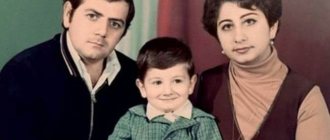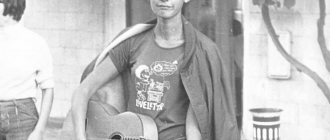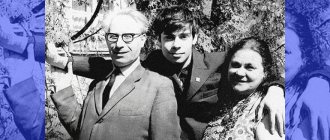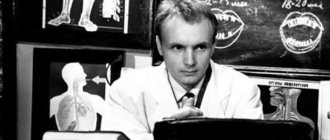Childhood
Mikhail Zharov was born on October 15, 1899 in the capital. His parents had nothing to do with cinema. The father of the future actor did not know his parents, as he was thrown into the Nikolaev orphanage, where he was later raised. It is known that the father of the future actor received his last name from his mentor. So he became Ivan Zharov. He worked in a printing house.
More is known about the actor’s mother. Anna Semenova Drozdova belonged to the serfs who lived in the Smolensk province.
Son of a foundling
Yes, that’s exactly what he was: the son of a foundling. The surname Zharov was given to the father of the great actor in the orphanage where he was thrown in infancy. The boy was given a simple name: Ivan. This request was indicated in the diaper in which the foundling was wrapped. The surname was invented by the shelter's mentor. Ivan Zharov, having lived through the hard life of a shelter, dreamed of a big family.
And so it happened. The family was formed into a large one, seven of them in shops. Ivan himself worked in the Bachman printing house. Over time, he placed his grown-up son Misha there. The boy was hired as a typesetter and was paid mere trifles: 50 kopecks a day. But any help was important to the family: there was a catastrophic lack of money.
However, the boy did not dream of working at all. Misha dreamed of the theater. Angular, thin, with disheveled hair, he went to enroll in the S.I. Zimin Opera Theater. True, at first not as an actor, but as a messenger. He delivered letters, tickets, and ran to the store. My career was not going well. Therefore, Zharov tried to move to the cabaret theater “The Bat,” but it didn’t work out. Then he went to submit documents to the Maly Theater School. But even there a turn awaited him. The admissions committee’s argument was reasonable: “The applicant has porridge in his mouth.” In the Moscow Art Theater studio, the young man also did not fit in.
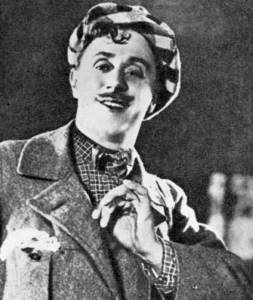
Mikhail Zharov as Mikhail Ivanovich in the film “Don Diego and Pelageya.” Directed by Y. Protazanov. 1927, Photo: RIA Novosti
Theater career
At the age of 17, Mikhail Zharov, whose biography is eventful, began working first as an administrator, and then as an assistant in the troupe of the Zimin Opera Theater. But Mikhail Ivanovich’s hard work was so high that soon they even began to trust him with the role of extras.
In 1918, Mikhail Zharov entered the theater of the Artistic and Educational Union of Workers' Organizations. His teachers in this studio were famous directors Arkady Zonov and Valery Bebutov.
In 1918, Mikhail Ivanovich made his first debut on the theater stage: he played in the comedy “The Merry Wives of Windsor,” where he successfully and talentedly played the role of the Jester.
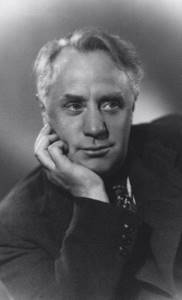
Two years later, having completed his studies at the studio, the young actor moved to the Experimental Heroic Theater. He played in the play “The Thunderstorm”, playing the roles of both Kudryash and Tikhon. In the theatrical production “Marriage” he got the character of Anuchkin. He also successfully performed the role of Shanbursi in the play “Piggy Bank”.
Soon Mikhail Zharov, an actor whom the whole country knows and loves, becomes an artist of the First Mobile Art Theater of Classical Comedy, which performed at the front. Here the talented young man played the role of Trinculo in the play “The Tempest”, and Leporello in the theatrical production “The Stone Guest”. It is known that in the play “The Golden Cockerel” he successfully portrayed an astrologer. In the theatrical performance "Captain Brunsbound" he also talentedly played the role of Drinkwater.
In 1921, Mikhail Zharov began performing on the stage of the Rogozhsko-Simonovsky Theater named after Safonov, and soon moved to the GITIS theater, where he was given mostly episodic, but very serious roles. For example, in the play “The Death of Tarelkin” he perfectly played Madame Brandahlystova, and in the theatrical production “Teacher Bubus” he played the secretary. Also, the famous and talented actor played a serious cameo role as an orderly in the play “Mandate”.
A special place in the theatrical career of the famous actor Mikhail Zharov, whose biography and personal life is always interesting to viewers, is occupied by participation in the Blue Blouse theatrical movement. This group was engaged not only in pop performances, its main direction was propaganda. They staged plays that dealt with a variety of topics. The focus could be both international political problems and minor events from everyday routine.
This theatrical movement, which began its existence in 1920, successfully campaigned for three years. This unusual theater received its name because of the special clothes worn by all the actors of this theater, including Mikhail Ivanovich Zharov. A loose blue blouse and black trousers were the main costume the actor wore on the stage.
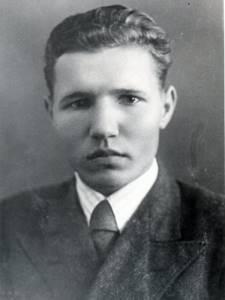
In 1926, Mikhail Zharov moved to the Baku Workers' Theater. After working there for two years, he left it, but returned again in 1929. In 1928, actor Zharov played at the Kazan Bolshoi Drama Theater. But already in 1930 he moved to the Realistic Theater. But even here he did not stay long. The very next year he transferred to the Chamber Theater, where he worked for eight years. It was on his stage that he played the role of Alexei in the play “Optimistic Tragedy.”
In 1938, the famous actor Mikhail Ivanovich Zharov moved to the Maly Theater and remained to work there until the end of his life. Here he played in thirty performances. Thus, he successfully performed the role of Kasyan in the theatrical production “My Friends,” as well as the role of Kovalev in the play “The Very Last Day.”
LiveInternetLiveInternet
Link: Source here
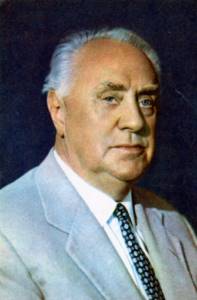
One morning in 1872, the watchman of the Nikolaev orphanage found a baby at the door in an elegant lace envelope with blue bows and an attached note: “Name the boy Ivan.” It is likely that the boy was the fruit of the love of some actress and a noble man. At that time, often young people, who were not allowed by class decency to unite, left their children in the Nikolaev orphanage. This is how Mikhail Zharov’s father, Ivan, was born.
Ivan received the surname Zharov from his teacher. At that time, there was a rule in the orphanage: each teacher took three pupils into her care and taught them a profession. When children were released into life, they received the surname of their mentor.
Mikhail Zharov’s mother, Anna Semenovna Drozdova, came from a family of former serfs in the Smolensk province.
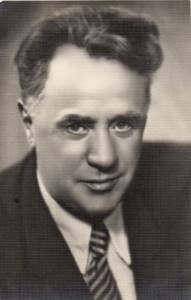
Childhood
At the beginning of the 20th century, infant mortality was still quite high. This did not bypass the Zharov family either. Their first daughter, Nadya, died in infancy. On October 27, 1899, Mikhail appeared. Then Shura was born, she also died... After her, in 1907, Lida was born, in 1911 another Shura, and then the youngest, Nina. The Zharov family lived a rather difficult life. Ivan Zharov worked as a printer in the Bachman printing house. He also placed his son Misha there. The boy worked as a typesetter for 50 kopecks a day. Over time, he was promoted to his position - he became an agent for printing orders. The financial situation in the family has become a little better. Everyone in the Zharov family loved books and loved art. It is not surprising that from childhood young Misha set up a theater in the yard, acting out scenes with the policeman and Petrushka. The dream of the theater came true at the age of 16...
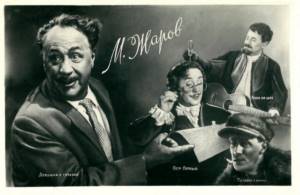
First roles in theater and cinema
In 1915, sixteen-year-old Mikhail Zharov was accepted into the S. I. Zimin Opera Theater. The actor’s daughter Elizaveta Zharova says: “You know, there is such a cliche - “a lanky teenager with a thin neck.” This is what the 16-year-old dad was like - thin, long, curly. He served Zimin on errands: he carried out small assignments, in particular, he delivered tickets for the poor...” On stage, Mikhail Zharov was trusted with the role of wordless extras. He first appeared before the audience in Cui's opera The Captain's Daughter. Mikhail portrayed a foreigner who crawls onto the stage from under the fence and gets hit in the head with a stick. At the very first performance, Misha lost consciousness from a blow and, having come to his senses, firmly decided: “I will be an artist.” Also in 1915, Zharov acted in films for the first time. It happened by accident. A person from the film crew came to the theater and invited everyone to act as an extra in the cinematic version of Rimsky-Korsakov’s opera “The Woman of Pskov” with Chaliapin in the role of Ivan the Terrible. Zharov idolized Chaliapin. By that time, he had already participated more than once in extras of performances where this famous singer played. Now I had the opportunity to work next to him on the set. In the film, Mikhail Zharov portrayed a guardsman. They glued on his beard, put him on a horse... He flashed only a moment in the frame, and even then it was quite difficult to recognize him, but, nevertheless, this was his cinematic debut.
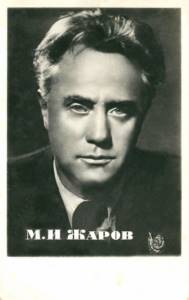
Revolution
In 1916, Zharov made an attempt to enter the newly opened cabaret theater "The Bat", but he was not accepted. Then Mikhail decided to study. And here failure awaited him. At first he was refused admission to the Maly Theater School. “You have porridge in your mouth,” one student who was present at the exam explained the commission’s decision. This was followed by a refusal at the Moscow Art Theater studio. The question of paid training disappeared by itself - Mikhail had nothing. He returned to the Zimin Opera House again. With the delight characteristic of his age, Mikhail greeted the 1917 revolution. Elizaveta Zharova recalls: “Dad signed up for the people’s squad, received some kind of mandate and proudly told his mother on the phone: “Mom, I’m people’s militia No. 10!” But in the morning his grandmother did not let him “make a revolution”: “Stay at home, they will manage without you!” Soon most of the studios were closed. Zharov, having received an invitation from Vladimir Toddi, director of the First Mobile Theater of the Red Army, went to perform on the Eastern Front.
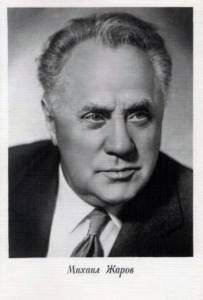
First wife. Son
In 1919, Mikhail Zharov returned to Moscow. He didn't return alone. Svetlana Zharova (the actor’s niece) recalls: “In 1919, Uncle Misha brought his wife Dina, a native of Minsk, from the Denikin Front, where he traveled with a propaganda train. The parents were shocked - Dina turned out to be two years older than her uncle, just a boy! They cried for two weeks, but did not reproach the young people with a word. When the children asked their mother for advice on getting married, she reasoned like this: “If I say “yes” and your life doesn’t work out, I will be to blame; If I say “no” and your life doesn’t work out either, it will be my fault again. Therefore, do as you see fit. And my father and I will always help you in everything." In 1921, Mikhail and Dina had a son, Zhenya. Subsequently he became an actor. Worked at the Comedy Theater named after N.P. Akimov, starred in the films “The Man in the Green Glove” and “Kalina Krasnaya”. It is worth noting that Evgeniy paved the way for himself; Mikhail Zharov could not tolerate cronyism and nepotism.
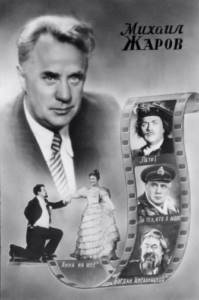
Theater activities
After studying a little at the Theater Studio of F. Komissarzhevsky, Mikhail Zharov in 1921 entered the Rogozhsko-Simonovsky Theater named after Safonov. After working there for less than a year, he moved to the Meyerhold Theater. There he successfully played episodic, sharp-character roles: Madame Brandahlystova (“The Death of Tarelkin”, 1921), secretary (“Teacher Bubus”, 1925), orderly (“Mandate”, 1925). The actor was hilariously funny, passionate, and assertive. In 1926, Zharov left Meyerhold. He worked at the Baku Workers' Theater (1926-1927 and 1929), at the Kazan Bolshoi Drama Theater (1928), at the Realistic Theater (1930), at the Moscow Chamber Theater (1931-1938). Among the most memorable characters of those years: the ridiculous house manager (“Zoykina’s Apartment”, 1927), the jokester Vaska Okorok (“Armored Train 14-69”, 1927), the demobilized Budennovsky (“First Horse”, 1929), the rude sailor Alexey (“Optimistic Tragedy ", 1933). Zharov's acting talent was most fully revealed at the Maly Theater, where he played from 1938 until the end of his days. Here he got mainly roles from the classical repertoire: Murzavetsky (“Wolves and Sheep”, 1941), the impressive Mayor (“The Inspector General”, 1946), the irrepressible Prokhor (“Vassa Zheleznova”, 1952), the drunkard Innokenty (“Heart is not a Stone”, 1954), the evil, ignorant Dikoy (“The Thunderstorm”, 1962).
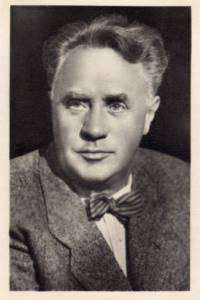
Second wife
In 1928, Zharov met actress Lyudmila Polyanskaya and left the family. Svetlana Zharova says: “Before that, he explained to his mother, and the mother said this: “Misha, Dina is my daughter, and she will stay with me. Zhenya is my grandson, and I will make sure that he never needs for anything. Take care of him too. If you want me to meet your new wife, I will come. Now go away." And Mikhail Ivanovich left. At first, she and Lyusya Polyanskaya lived in a communal apartment. We lost two sons - they died as babies. With growing popularity, money came, my uncle got an apartment in the center of Moscow. Mikhail Ivanovich filled it with objects of his passion - books.”
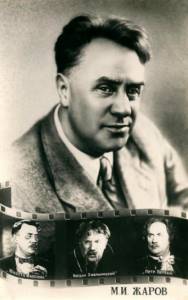
Movie. 20s
Back in the mid-20s, Mikhail Zharov began acting in films. Zharov played his first big role - the Red Army soldier Yegor, who cheated on his wife with a young girl - in 1925 in the film “The Way to Happiness.” Mostly in those years, Mikhail played small roles: the sex worker in the film comic “Miss Mend”, the chairman of the Revolutionary Committee in the drama “Two-Buldi-Two” and others. But even in small roles, he found expressive characteristic details for his characters, rich, bright colors, endowing everyone - both negative and positive characters - with a common quality: they are all great lovers of life, charming, confident and comfortable in this life. It is no coincidence that already in those years Zharov was considered an unsurpassed master of the episode.
"Journey to Life"
Mikhail Zharov's real fame came from the role of Zhigan in Nikolai Eck's drama “A Road to Life” (1931). This first Soviet sound film was about a commune for street children. Zharov played the leader of a gang of thieves, a bandit-killer who leads young street children astray. In the role of Zhigan, the artist skillfully used the possibilities of sound cinema: he played the guitar and sang, gave his hero a special speech, demonstrated a unique charm and the same chic. Zharov’s character turned out to be so convincing and alive that even the world of thieves recognized him as “one of their own.” A noteworthy incident happened once with an actor. One day his wallet was stolen in a store. On the way out, Zharov heard one thief say to another: “Don’t you recognize your own people?” The wallet has been returned!
Movie. 30s
The 30s were the heyday of Mikhail Zharov’s nationwide popularity. The artist was in great demand in the cinema. The most famous directors invited him. For Vladimir Petrov, he played the cheerful mischievous Kudryash (The Thunderstorm, 1934) and the good-natured, cheerful courtier Menshikov (Peter the Great, 1937), for Isidor Annensky - the loud, healthy landowner Smirnov (The Bear, 1938) and a cheerful teacher Kovalenko (“Man in a Case”, 1939). In the films of G. Kozintsev and L. Trauberg about the revolutionary Maxim (“The Return of Maxim,” 1937 and “Vyborg Side,” 1938), Zharov again played a negative character, the clerk Dymba, with chic and charm. As the film progressed, he sang the still famous song: “Fried chicken, steamed chicken, chicken also wants to live.” The popularity of his character and song was such that Zharov even had to turn to the government with a request to give him a car - he could not appear on the street, the boys teased: “The fried chicken is coming!” Here is another case related to the unheard-of popularity of Zharov. Once he was vacationing in the south and during a walk in the government residence he met Stalin. The artist tried to avoid the meeting, but the leader playfully told him: “And I know you!” “Of course,” Zharov muttered in confusion. “Everyone knows me.”
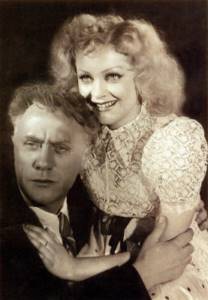
Lyudmila Tselikovskaya
In 1943, on the set of the musical comedy “Air Cabman,” Mikhail Zharov met actress Lyudmila Tselikovskaya. Svetlana Zharova says: “By this time, things had not been going well in my uncle’s family for a long time. Luda Polyanskaya preferred to play solitaire with her mother in the evenings, and when the breadwinner returned home after two shifts at the pavilion, he found bored ladies and... no dinner. At the same time, the mother-in-law made a still dissatisfied face. She was painfully proud of her high origins (though no one knew what it consisted of) and considered Mikhail Ivanovich and his relatives to be plebeians. My uncle, his wife and mother-in-law lived in the so-called “laureatnik” - together with Eisenstein, Cherkasov and many other famous cultural figures. And the rest of the Zharov family, unloved by their mother-in-law—father, mother, nieces, and myself included—huddled in one room on Dykhanskaya Street.” Naturally, it is difficult for any person to live in such an atmosphere. And it was during this difficult period for the actor that he met Lyudmila Tselikovskaya, who was twenty years younger than Mikhail Ivanovich. The young actress was extremely beautiful and flirtatious. In the film, Mikhail Zharov played the no longer young, brave pilot Baranov, in love with an aspiring singer, whose role was played by Tselikovskaya. They carried love from the screen into life. When parting with Lyudmila Polyanskaya, Mikhail Ivanovich did what he had done all his life in similar situations: he left his ex-wife a large apartment on Tverskaya, without taking anything from there - not even his favorite books. Svetlana Zharova says: “When Lyusya (Polyanskaya) died many years later, Mikhail Ivanovich organized the funeral. At the wake, her uncle told her adopted son that he wanted to take away one thing: his library. The smart boy immediately put forward a counter-offer: “Mikhail Ivanovich, you register me in this apartment, and I will give you the books.” My uncle turned purple, turned around and left silently.” Mikhail Zharov lived with Lyudmila Tselikovskaya for seven years. Initially, they rented a room at the Moscow Hotel, then Mikhail Ivanovich received a small apartment.
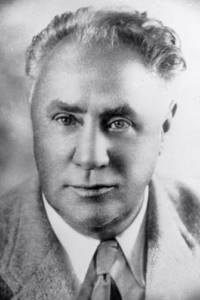
Wartime films
In addition to the already mentioned “Air Cabby”, Mikhail Zharov starred in a dozen films during the war: “Defense of Tsaritsyn”, “Actress”, “In the Name of the Motherland” (an old experienced soldier Glob), “Young Fritz” (Fritz), “Twins ( Eropkin) and others. Films of different levels and with different fates. For example, the propaganda satirical pamphlet “Young Fritz” was never released. But the comedy “Twins” (1945), where Mikhail Zharov played the main role opposite Lyudmila Tselikovskaya, was a great audience success for many years. One of Zharov’s most striking works during the war was the role of Malyuta Skuratov in the historical film “Ivan the Terrible” (1944). Lyudmila Tselikovskaya also starred with him again. It was originally planned that the famous ballerina Galina Ulanova would play in the film, but Zharov insisted on the candidacy of his young wife. Especially for Tselikovskaya, Zharov took up directing, staging the military comedy “Restless Household.” Alexander Grave, the leading actor in the film, recalls what kind of director Mikhail Zharov was: “He held everyone tightly, but did not tyrannize. Yes, he himself did not tolerate the “Napoleons”. I worked with pleasure, came up with a lot, valued the atmosphere of the film, wonderful. What I regret is that I broke up with Misha Zharov. He was the most real in my life.”
Mayan
While relaxing in the Istra sanatorium, Mikhail Zharov met the family of famous doctors Gelstein - Eliazar Markovich, Ginda Khaimovna and their daughters Maya and Vika. Mikhail Ivanovich, whose age by that time was already approaching fifty, fell madly in love with Maya, who was thirty years younger than him. The lover Zharov himself seemed to have become younger, becoming the leader of a youth company: forest, bonfires, boats, hikes. Maya couldn’t help but notice the magnificent actor. Soon she left to take the exam in Moscow. There she remembered him again and again, bought postcards with his image and wrote in her diary: “What should I do? I fell in love with the old ugly artist Zharov!..” She could not even imagine that the middle-aged actor had the same feelings for her. When Maya returned to the sanatorium, Zharov fell to his knees in front of her and cried: “I know that I shouldn’t tell you this, but I love you madly...”. Soon he formally proposed to her. Maya’s sister Victoria Kilinskaya recalls: “One autumn evening in 1949, a bell rang in our apartment. I opened the door: on the threshold stood People’s Artist of the USSR Mikhail Ivanovich Zharov himself. Probably, at that moment I would have been less surprised to see Lenin with Stalin. “Are you Vita? And I...” - “I know who you are!” - “Of course, you know. The whole country knows me. But seriously, I would like to talk to Eliazar Markovic.” Dying from curiosity, I took Zharov to my father and closed the door tightly. Dad told us everything that happened next. Zharov, entering the office, knelt down and asked for my sister’s hand in marriage. They talked with their father for six hours. The matter ended with drinking that very treasured bottle of wine, saved by Eliazar Markovich for his daughter’s marriage.”
Test of character
Mikhail Ivanovich proposed to Maya at a very difficult time. It was during this period that the notorious persecution of Jewish doctors began. One of the first to be persecuted was Maya's father, Elizar Markovich. First there was an article in the student newspaper, throwing mud at the emeritus professor. Then began countless commissions to check the work of his department. Elizar Markovich suffered several heart attacks, but each time he returned to the institute - he taught, wrote articles and textbooks. In 1952 he submitted his resignation, and in February 1953 he was arrested. His wife was also arrested. Mikhail Ivanovich and the entire Zharov family behaved very honorably. When everyone turned their backs on the Gelstein family, they alone supported them morally. Moreover, Zharov also sheltered Maya’s sister Vika in his apartment. At that time, the Zharovs’ daughter Anyuta was already growing up, and Maya was expecting her second child. All these events could not but affect Mikhail Zharov. The management of the Maly Theater removed him from the post of party secretary. Yesterday's acquaintances, who had recently fawned and fawned over him, now averted their eyes so as not to say hello again. But Mikhail Ivanovich not only did not change his position, but at one of the meetings he sharply declared that he would never renounce his wife’s parents. Then the phone threats started...
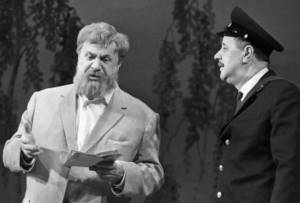
Naturally, there was no question of any work in cinema or theater in the early 50s. Only after Stalin’s death, when Maya’s parents were rehabilitated, did Zharov begin acting in films again. He played Prokhor in the film-play “Vassa Zheleznova”, Artynov in Isidor Annensky’s melodrama “Anna on the Neck” (1954), Sviristinsky in the musical comedy “Girl with a Guitar” (1958). Later, he appeared before moviegoers, albeit in small but bright roles: the dull minister of war in the musical comedy "Cain XVIII", based on the fairy tale "Two Friends" by Evgeniy Schwartz, and the cynic Ukhov in the melodrama "Elder Sister" by Georgy Nathanson. The theater audience never forgot him and always received him enthusiastically.
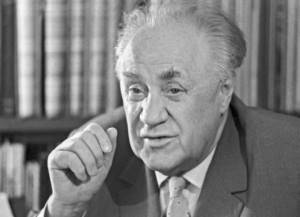
Aniskin
The last popular success of Mikhail Zharov was the role of the village detective Aniskin. The first film about this almost folklore character, which was called “Village Detective,” was produced in 1968 by director Ivan Lukinsky based on the story of the same name by Vil Lipatov. The public, critics, and superiors liked the policeman Aniskin so much that soon two more television films about the cunning and good-natured rural police officer were released: “Aniskin and Fantomas” and “Aniskin Again.” Mikhail Zharov directed his latest film “Aniskin Again” himself. By that time he was already seriously ill, but he behaved with dignity in front of the camera. It should be noted that in recent years the actor has shown signs of “stardom”. Zharov, who was very sensitive about his fame and his figure, reacted sharply to the cameraman if he moved the camera lens away from him. It is no coincidence that the film constantly contains only close-ups of Zharov. But let’s forgive this wonderful actor, who did so much for Soviet cinema, his slight weakness. Moreover, films about Aniskin really still bring pleasure to viewers, including his unique acting. In December 1981, Mikhail Ivanovich Zharov died. With his death, the charming roguery, the cute swagger of characters, the chic and brilliance of acting went away from our art.
Film career
Actor Zharov began his cinematic career in 1915, playing a small cameo role as a guardsman in the film “Tsar Ivan Vasilyevich the Terrible.” Other cameo roles followed. For example, in the film “The One Who Gets Slapped” he plays a corporal, and in the film “Aelita” he successfully plays the role of a man.
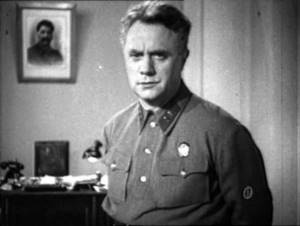
The talented actor Zharov received his first leading role in 1925 in the film “The Way to Happiness” directed by Sergei Kozlovsky. A young Red Army soldier, Yegor Mironov, fell in love with a pretty young girl. But his wife is waiting for him at home. Returning home, he learns that his wife died in childbirth, so he returns to his beloved.
But still, wide fame and glory came to the actor Zharov only in the 1930s. At this time, the most famous directors invited him to star in various films. It was at this time that he played his best role - a bandit in the film “A Start to Life”.
One of the main roles of the actor
The most striking and significant work in the career of actor Zharov was the film “Twins” directed by Konstantin Yudin. In this comedy project, the man played the head of the base, Vadim Eropkin. The main character finds two twins. Since they have no parents, the woman decides to adopt them, but Eropkin, who was going to marry Lyuba Karaseva, opposes such an act of mercy.
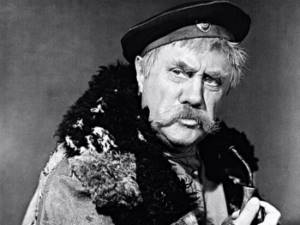
One day, the kids disappear, and their search leads to the fact that not only their natural mother is found, but it also turns out that it is Vadim Spiridonovich Eropkin who is their father. This film was released in cinemas in 1945.
Director's work in cinema
It is known that in 1946, the famous actor Mikhail Zharov, whose films many people know, tried himself as a director in cinema. Thus, his first film was the film “Restless Household”, in which the viewer is transported to wartime.
During the Great Patriotic War, soldier Ogurtsov hurries to his new duty station. On the way, he meets a girl, and when he gets to the facility of Sergeant Major Semibaba, played by director Zharov himself, he is surprised at how fun and musical the days pass here.
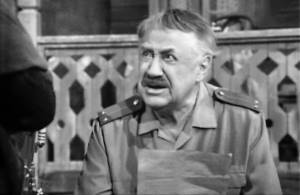
In 1973, Mikhail Zharov, together with such directors as Ivanov and Rapoport, shot the film “Aniskin and Fantomas”. The main male role, Aniskina, is played by Zharov himself in this film. His hero is trying to investigate a surprising and unusual cash register robbery.
In 1977, the tireless Mikhail made another film, which was a continuation of the previous one. This is the film “And Again Aniskin,” which was shot together with director Ivanov. It tells how the investigation into the theft of exhibits from the museum of applied arts, which is located in the village, is going on.
Awards and titles[ | ]
- Hero of Socialist Labor (November 4, 1974)
- Honored Artist of the Republic (1935)
- People's Artist of the RSFSR (April 21, 1944)
- People's Artist of the USSR (October 26, 1949)
- People's Artist of the Azerbaijan SSR (June 18, 1964)
- Stalin Prize, first degree (1941) - for playing the role of Prince A. D. Menshikov
in the film “Peter the Great” (1937, 1938) - Stalin Prize, first degree (1942) - for his performance as the Cossack Perchikhin
in the film “The Defense of Tsaritsyn” (1st episode) - Stalin Prize of the second degree (1947) - for playing the role of Mikhail Mikhailovich Kharitonov
in the play “For Those Who Are at Sea!” B. A. Lavreneva - Three Orders of Lenin (1967, 1970, 1974)
- Order of the October Revolution (1979)
- Two Orders of the Red Banner of Labor (1938, 1949)
- Order of the Red Star (1944)
- Medal "For Labor Distinction" (1967)
- Medal "For Valiant Labor in the Great Patriotic War of 1941-1945"
- Medal “For Valiant Labor. In commemoration of the 100th anniversary of the birth of Vladimir Ilyich Lenin" (1970)
- Medal "In memory of the 800th anniversary of Moscow"
- Medal "Veteran of Labor"
- Medal "Thirty Years of Victory in the Great Patriotic War 1941-1945"
- VKF (Honorary Diploma of the Jury for the leading role, film “Village Detective”, 1970, Minsk)
- Prize of the Ministry of Internal Affairs of Russia (posthumously)
Personal life
The famous and popular actor Mikhail Zharov in Soviet times was married four times. His first wife was a Russian language teacher, honored teacher Nadezhda Guzovskaya. In this marriage, the actor had a son, Evgeniy, who later followed in his father’s footsteps. The famous and talented actor entered into his first marriage in 1919, but it lasted only nine years.
In 1928, the famous actor Zharov married for the second time. Lyudmila Polyanskaya became Mikhail Ivanovich’s new chosen one. She gave birth to two sons to the actor, but these children of Mikhail Zharov died in infancy. The couple lived together for four years, and then Mikhail Ivanovich left the family, leaving his wife an apartment, and even his favorite books.
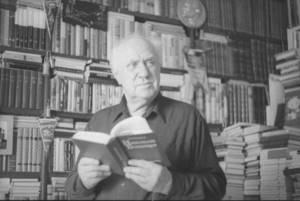
The third wife of the hero of our article is Lyudmila Tselikovskaya, who was also a film and theater actress. Their marriage lasted five years, and then broke up due to Lyudmila Vasilievna’s new romantic interest.
With his fourth wife, the famous actor had a difference of 30 years. Mikhail met the daughter of a cardiologist, Maya Gelshtein, at the Istra sanatorium. They started their family in 1949, and two years later the happy couple had a daughter, Anna, who later became an actress. After this, another girl was born - Elizabeth.
Actor Zharov died in mid-December 1981 in the capital.
